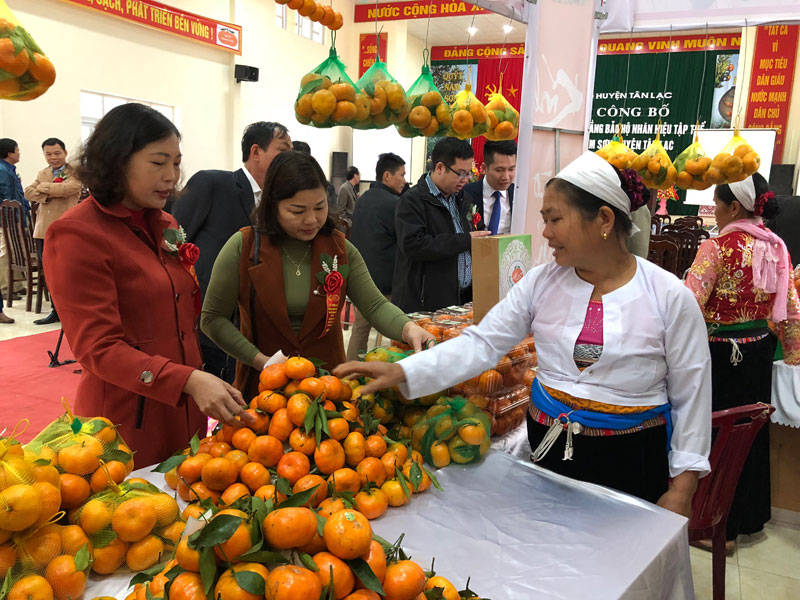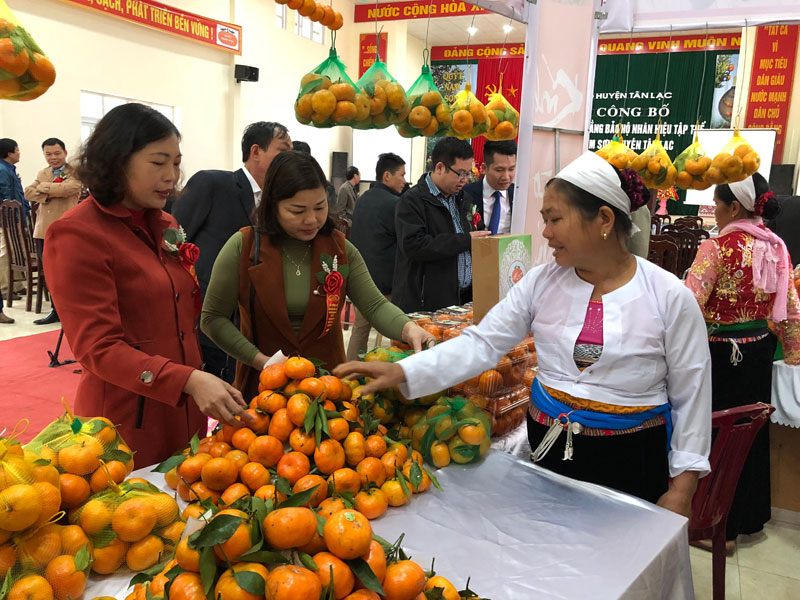
(HBO)- Thus, up to now, three specialties such as Tan Lac chayotes, Tan Lac pomelos and Nam Son tangerines have had protection certificates.

Consumers visit Nam Son tangerine area and
buy local specialties
By the end of 2018, the area of red pomelos
and green pomelo in the district reached over 1,000 hectares, of which 395
hectares have been harvested with the average productivity of 30 tons / ha. By
the end of 2017, Tan Lac pomelos received a collective trademark protection. At
the same time, the certification have opened a wide market for Tan Lac pomelos,
and the product reputation is confirmed. Red pomelos, the local specialty, has
been present at big restaurants and supermarkets in Hanoi City, in provinces
from North to South with the average selling price of 30,000 VND / kg. The red
pomelo growers have an average income of over VND 600 million / ha.
Before that, in the last days of 2016, Tan
Lac highland chayotes were honored to receive the brand certification. Instead
of hiding Tam Dao chayotes, selling at low prices and struggling about the
output market for many years, VietGAP products are of high quality, ensuring
food safety since the collective marks has been set up and has caught up with
the big markets. Tan Lac chayotes with full packaging, stamps and labels have
affirmed the local clear origin. The products, which used to unstable in the
market and the price sometimes dropped to 2,000 VND / kg, have increased by 2-3
times, maintaining the price of cooperatives to buy with the product
consumption of 5,000-6,000 VND / kg. The area of chayotes in the highlands of
Tan Lac is about 95 ha, and in Quyet Chien commune is 60 ha.
According to data from the Hoa Binh Provincial Party Committee, the industrial production index for the first six months of 2025 is estimated to have increased by 20% compared to the same period last year. This marks the highest year-on-year growth rate for this period since 2020.
In the first six months of 2025, Hoa Binh province’s export turnover was estimated at 1.145 billion USD, marking an 18.11% increase compared to the same period in 2024. Import turnover was estimated at $ 804 million, a 17.15% increase, which helped the province maintain a positive trade balance.
The lives of the ethnic minority farmers in Tan Lac district have gradually improved thanks to the new directions in agricultural production. This is a testament to the collective strength fostered through the professional associations and groups implemented by various levels of the district’s Farmers’ Union.
With the motto the "product quality comes first,” after nearly one year of establishment and operation, Muong village’s Clean Food Agricultural and Commercial Cooperative, located in Cau Hamlet, Hung Son Commune (Kim Boi district), has launched reputable, high-quality agricultural products to the market that are well-received by consumers. The products such as Muong village’s pork sausage, salt-cured chicken, and salt-cured pork hocks have gradually carved out a place in the market and they are on the path to obtaining the OCOP certification.
In the past, the phrase "bumper harvest, rock-bottom prices" was a familiar refrain for Vietnamese farmers engaged in fragmented, small-scale agriculture. But today, a new spirit is emerging across rural areas of Hoa Binh province - one of collaboration, organisation, and collective economic models that provide a stable foundation for production.
Maintaining growing area codes and packing facility codes in accordance with regulations is a mandatory requirement for agricultural products to be eligible for export. Recently, the Department of Agriculture and Environment of Hoa Binh province has intensified technical supervision of designated farming areas and packing facilities to safeguard the "green passport" that enables its products to access international markets.



